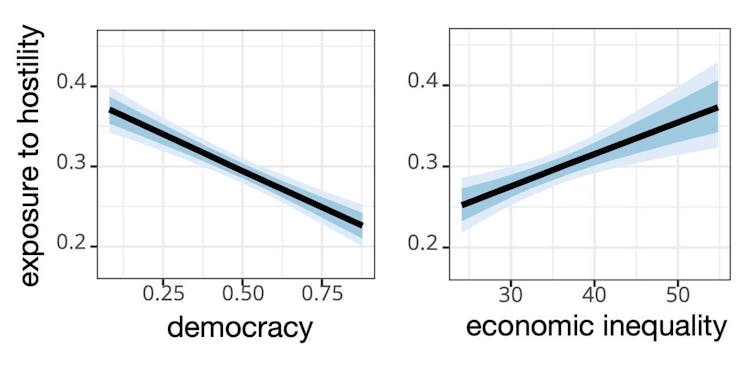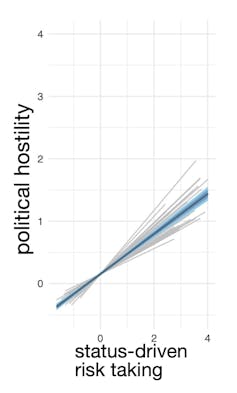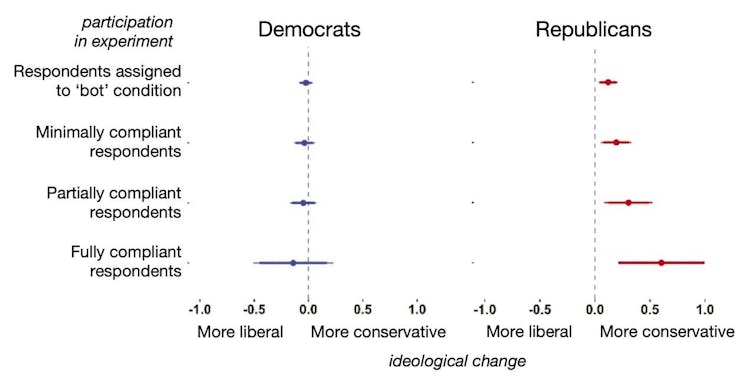Once upon a time, newly minted graduates dreamt of creating online social media that would bring people closer together.
That dream is now all but a distant memory. In 2024, there aren’t many ills social networks don’t stand accused of: the platforms are singled out for spreading “fake news”, for serving as Russian and Chinese vehicles to destabilise democracies, as well as for capturing our attention and selling it to shadowy merchants through micro targeting. The popular success of documentaries and essays on the allegedly huge social costs of social media illustrates this.
One of those critical narratives, in particular, accuses digital platforms and their algorithms of amplifying political polarisation and hostility online. Some have gone so far as to say that in online discussions, “anyone can become a troll”, i.e., turn into an offensive and cynical debater.
Recent scholarship in quantitative social sciences and scientific psychology, however, provides important nuance to this pessimistic discourse.
The importance of social context and psychology
To start with, several studies suggest that if individuals regularly clash over political issues online, this is partly due to psychological and socioeconomic factors independent of digital platforms.
In our large scale cross-cultural study, we surveyed more than 15,000 people about their experiences of online conversations about social issues. Interviews were carried out via representative panels in 30 countries across six continents. Our first finding is that it is in economically unequal and less democratic countries (e.g., Turkey, Brazil) that individuals are most often victims of online hostility on social media (e.g., insults, threats, harassment, etc.). A phenomenon which seems to derive from frustrations generated by more repressive social environments and political regimes.

Our study also shows that the individuals who indulge most in online hostility are also those who are higher in status-driven risk taking. This personality trait corresponds to an orientation towards dominance, i.e., a propensity to seek to submit others to one’s will, for instance through intimidation. According to our cross-cultural data, individuals with this type of dominant personality are more numerous in unequal and non-democratic countries. Similarly, independent analyses show that dominance is a key element in the psychology of political conflict, as it also predicts more sharing of “fake news” mocking or insulting political opponents, and more attraction to offline political conflict, in particular.

Replicating a previous study, we also find that individuals high in status-driven risk taking, who most admit to behaving in a hostile manner online, are also those most likely to interact in an aggressive or toxic manner in face-to-face discussions (the correlation between online and hostility is quite strong: β = 0.77).
In summary, online political hostility appears to be largely the product of the interplay between particular personalities and social contexts repressing individual aspirations. It is the frustrations associated with social inequality that have made these people more aggressive, activating tendencies to see the world in terms of “us” vs “them”. On a policy level, if we are to bring about a more harmonious Internet (and civil society), we will likely have to tackle wealth inequality and make our political institutions more democratic.
Networks: prisms exaggerating ambient hostility
Although our study puts online political hostility into perspective, it does not deny social media platforms any causal role in fuelling political polarisation and hostility.
Social networks allow content to be spread faithfully to millions of people instantaneously (unlike verbal communication, where inevitable distortions occur). Because of this, they make it possible to misinform or anger millions of people at very little cost. This is true whether the false or toxic information is intentionally created to generate clicks, or whether it is the unintended side-effect of the political biases of a given political group.
If exchanges on social networks often lack civility, it’s also because of the possibility they offer of exchanging with anonymous and depersonalised strangers. This experience, unique to the Internet age, reduces our sense of personal responsibility and empathy towards interlocutors whom we no longer see as individuals but as the interchangeable members of political “tribes”.
Recent analyses also remind us that social networks operate less as a mirror than as a distorting prism for the diversity of opinions in society.
Indeed, outraged and potentially insulting political posts are generally written by people who are more committed to express themselves and more radical than the average person, whether it’s to signal their commitments, express anger, or mobilise others to join political causes. Even when they represent a relatively small proportion of the written output on the networks, moralistic and hostile posts tend to be promoted by algorithms programmed to push forward content capable of attracting attention and triggering responses, of which divisive political messages are an important part.
On the other hand, the majority of users, who are more moderate and less dogmatic, are more reluctant to get involved in political discussions that rarely reward good faith in argumentation and often escalate into outbursts of hatred.
These selection and perception biases combine to produce the misleading impression that radical and hostile beliefs are more widespread and more morally tolerated than they actually are.
When exposure to opposing views annoys
That said, the social media use seems to contribute to increasing political hostility and polarisation through at least one mechanism: exposure to caricatural versions of the political convictions of one’s rivals.
Contrary to widespread belief, most of our virtual connections don’t typically take on the form of “echo chambers”, isolating us into silos of homogeneous political worldviews.
Although some networks are indeed constructed in this way (4Chan or certain sub-Reddits), the largest platforms such as Facebook (three billion users) and X (550 million) typically present us with a certain diversity of opinions. This diversity is often greater than the political diversity of our friendships: are you still in regular contact with school friends who took a far right turn? Probably not, but it’s more likely that you read their Facebook posts.
This exposure to ideological otherness is desirable, in theory, as it should help us discover the blind spots in our political knowledge and convictions, acknowledge our common humanity, and therefore make us both more humble and more respectful of each other. Unfortunately, the way in which most people express their political convictions – both on social media and at the coffee machine – is rather lacking in nuance and tactfulness. It tends to reduce opposing positions to demonised caricatures, and is less concerned with persuading the other side than with signaling devotion to particular groups or causes, galvanising people who already agree with you, and maintaining connections with like-minded friends.
Based on field experiments carried out on Twitter and interviews with Democrat and Republican activists, sociologist Chris Bail has issued a warning to us in his book The Prism of Social Networks. He explains that repeated exposure to unconvincing claims or headlines produced by our political enemies (a fortiori posts attacking one’s ingroup) can paradoxically reinforce partisans from each side in their pre-existing positions and identities, rather than bringing them closer to each other in terms of worldviews and sentiments.

However, this relationship between social media use and political polarization seems to depend a lot on duration of exposure and does not appear in all the samples surveyed. Thus, recent studies exploring the effects of stopping Facebook and Instagram use failed to observe that social media noticeably polarize users’ political opinions.
Let us always remember that narratives pointing to threats on society enjoy a considerable competitive advantage on the market of ideas and conversations, due to their attractiveness to our minds. One should thus approach the question of the relationship between social media, and political hostility and polarisation, by avoiding the symmetrical pitfalls of naive optimism and collective panic.
Antoine Marie a reçu des financements de la fondation Carlsberg, de l'Université Paris Cité et du CNRS.
This article was originally published on The Conversation. Read the original article.







